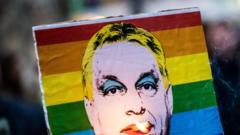Despite a backdrop of governmental pressure and legal threats, Budapest's Pride parade is expected to attract record numbers this weekend, showcasing resilience from the LGBTQ community.
Hungarian Pride March Set to Proceed Amidst Government Opposition

Hungarian Pride March Set to Proceed Amidst Government Opposition
Amidst threats from PM Viktor Orban, Budapest Pride organizers remain determined to proceed with the march on Saturday.
In a bold defiance against Hungarian Prime Minister Viktor Orban's recent legal warnings, Budapest Pride organizers have asserted their intent to move forward with the march scheduled for Saturday. The event, which promises to draw record attendance, comes amidst increasing nationalist rhetoric and active pressure from law enforcement aimed at restricting pro-LGBTQ expressions.
Hungary's police authorities have attempted to stifle the event under a controversial "child protection" law, claiming that such gatherings promote homosexuality, and have issued a ban on displays deemed inappropriate. Despite the government's heavy-handed tactics, including potential fines of up to €500 for attendees and possible imprisonment for organizers, the march's supporters remain unyielding.
In a recent interview, Prime Minister Orban acknowledged the tension surrounding the event but insisted on maintaining the perception of civility in Hungarian society. “While legal consequences might arise, I assure you there will be no physical violence,” he stated on state radio. Critics, however, argue that his administration's stance could incite conflict.
International support is evident, with the European Commission's equalities commissioner, Hadja Lahbib, expected to participate in the march alongside a cohort of MEPs. Lahbib expressed her solidarity through social media, showcasing her partnership with Budapest's liberal mayor in front of LGBTQ symbols.
As European Commission President Ursula von der Leyen called on Orban's government to allow the march to proceed without interference, Orban's government has remained resolute, emphasizing its sovereignty over internal law enforcement matters. As the day of the march approaches, LGBTQ advocates prepare to make a significant statement about freedom and civil rights in Hungary.
Hungary's police authorities have attempted to stifle the event under a controversial "child protection" law, claiming that such gatherings promote homosexuality, and have issued a ban on displays deemed inappropriate. Despite the government's heavy-handed tactics, including potential fines of up to €500 for attendees and possible imprisonment for organizers, the march's supporters remain unyielding.
In a recent interview, Prime Minister Orban acknowledged the tension surrounding the event but insisted on maintaining the perception of civility in Hungarian society. “While legal consequences might arise, I assure you there will be no physical violence,” he stated on state radio. Critics, however, argue that his administration's stance could incite conflict.
International support is evident, with the European Commission's equalities commissioner, Hadja Lahbib, expected to participate in the march alongside a cohort of MEPs. Lahbib expressed her solidarity through social media, showcasing her partnership with Budapest's liberal mayor in front of LGBTQ symbols.
As European Commission President Ursula von der Leyen called on Orban's government to allow the march to proceed without interference, Orban's government has remained resolute, emphasizing its sovereignty over internal law enforcement matters. As the day of the march approaches, LGBTQ advocates prepare to make a significant statement about freedom and civil rights in Hungary.





















